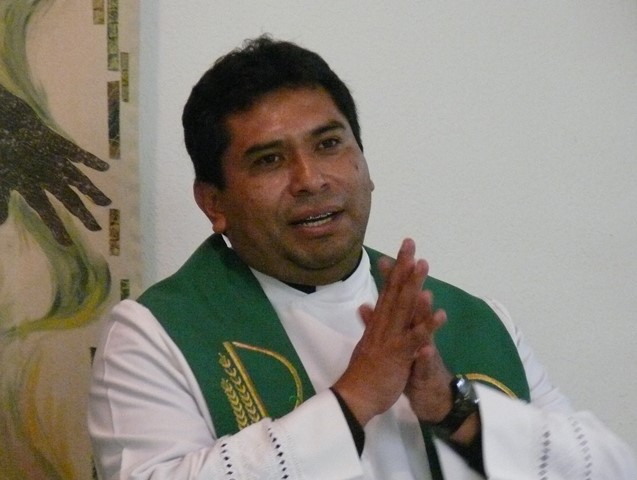JESUS CHRIST LIBERATES
By our Pastor, Fr. Carmelo Jiménez
The first reading and Gospel reading for this Sunday coincide, but it would seem at first glance that the first reading is giving a reason to separate the sick from the healthy to not spread the sickness. The Gospel seems like one more miracle of Jesus returning health to a leper. If we see it as such, then the readings are stories of the past and we’ve finished explaining them. But they are not just stories, they are more complex realities that need us to delve into them and ask ourselves about our daily behavior.
Many years ago, when I had first come to Chenalho, a town in the mountains of Chiapas, I went to the plaza one Saturday to look for flowers to take back to my home town to my mother’s grave. In that area they cultivate gladiolas and the season had just begun, so there weren’t a lot of flowers. These flowers were still about 10 times cheaper than if I had bought them at a market in the city, but since it was the beginning of the season it was a little more expensive than usual in this town than it would have been later in the season.
I went into the plaza and found a man with a few dozen flowers, I asked what they cost and he told me $3.00 pesos per dozen (about .20 cents) because there weren’t many flowers yet. I told him I’d like them and some more. He took me to his stand and came up with 11 dozen total. I told him I wanted all of them. He did the math and said that if I was going to buy all 11 bunches, then he would charge me for 10 bunches, so it would be $30.00 pesos (about $2 US). So he would give me one and finish his selling for the day. When I’m taking out my money I hear a woman’s voice behind me shouting things at the vendor: “Indian! Smelly! Thief! The flowers cost one peso not three and here are your $11.00 pesos and don’t steal from the poor father!” She snatched the flowers from his hand and put $11.00 pesos in the hand of that man and gives me the flowers saying: “here father, I’m giving them to you.” The man just stood there stunned with $11.00 pesos (.75 cents) in his hands, his entire harvest of flowers for the week gone. How much could that buy him? What could he buy to bring back home with that? I thanked the woman for the gesture of giving me the flowers, took her money from the man’s hand and gave it back to the woman. I gave the flowers back to the man to then continue with our original deal between him and me. The woman very angry with me says: “that’s why they **** you over father because you let these abusive people do it to you.”
Now, let us look back at the first reading, when the priest declared a person impure it was to exclude them from the community, not to attend to them or cure them, but to take away their value, their dignity, to distance them from the community and they were expelled to the caves. There they lived isolated without any right to have contact with their loved ones, without any right to medicine, without affection; they were smelly, completely marginalized from society. So, when Christ cured someone he was returning their dignity, he was returning their family, he was returning their life and reinserting him into society.
In our times there are a lot of ways that people are oppressed and pushed away, maybe not for an illness but maybe for their different way of thinking, for their sexual preferences, for their nationality, for their political preferences, for their skin color, for the great difference of language.
Today more than ever, God is asking us to return people their dignity and he calls us to stop making distinctions among us. First of all, here in the U.S., let us not marginalize people for not having immigration papers. Secondly, let us not marginalize people for their sexual preference, I’m not saying it is good to be lesbian or homosexual, but let us not treat them as if they are people without salvation; they need affection, not rejection. Those who are sick need our support and many times our care; I’m speaking of those with terminal illness or those with special needs. Lastly, may we not judge a person by skin color, or race, or language. We are all sons and daughters of God and we deserve each other’s respect.
God loves us and gives us dignity, don’t let anyone trample your dignity and don’t trample anyone else’s. Neither money nor the color of one’s skin or anything else should cause differences. Christ who heals hearts, may he heal our hearts so we can come to accept others as our brothers and sisters, worthy of this name and so rid ourselves of all leprosy and may he give us a place in the celestial assembly at the end of our lives.
